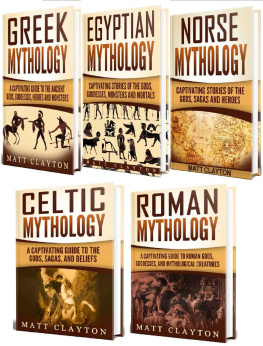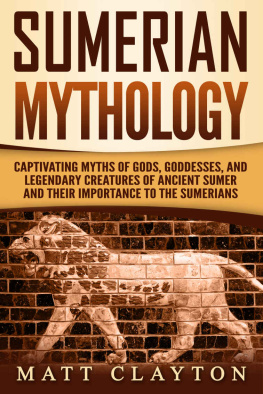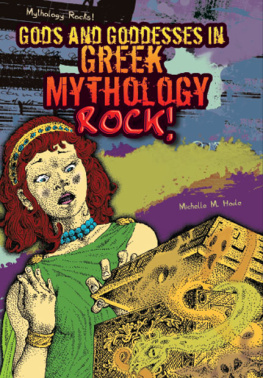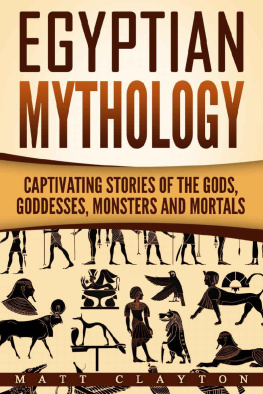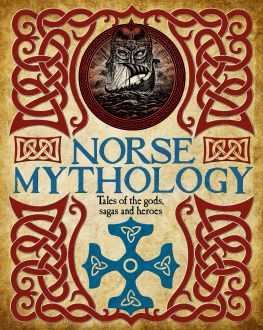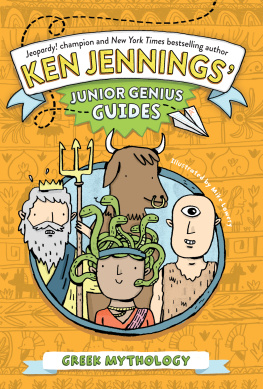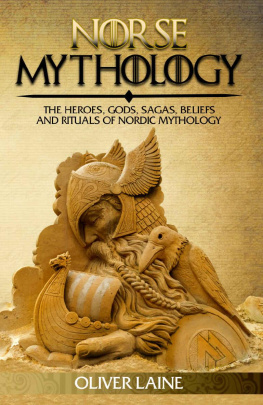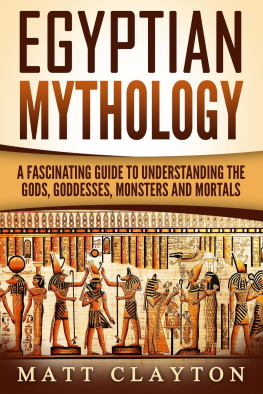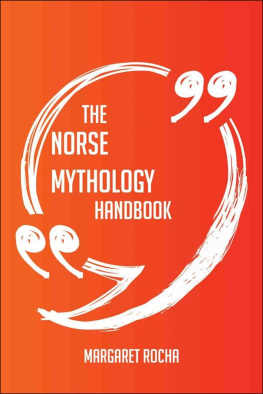Any book on ancient mythology gives us a glimpse into the minds of civilizations pioneers. They were the brave adventurers who explored the unknown territory of possibilities. For them, civilization was yet a mysterious realm with countless directions to go.
The broad arc of this book takes us from the dim beginnings of creation as seen in the Greek mythology. We move through the birth of Titans, their overthrow by the Olympian gods, the gods dealings with mortals like Paris of Troy, Jason and the Golden Fleece, the Trojan War, and into historical times.
We wont cover every possible version of every myth, but by the time youre finished with this book, you will have a good appreciation for the nature of Greek mythology and the gods, monsters, and heroes which populate it.
Chapter 1 Uranus: Betrayal by Cronus
In the very beginning, Chaos (void) ruled the universe. It was the great nothingness. Boring? Of course. Perhaps the sheer blandness of all that empty nothingness forced Gaia (goddess of Earth) to spring into existence from all that emptiness. Close behind, Chaos gave birth to Tartarus (god of the underworld), Eros (god of fertility), Erebus (god of darkness) and Nyx (goddess of night).
Gaia (mother Earth) was so full of fertility that she gave birth to two other primordial gods without having to mate with anyone. Of course, Chaos had no gender, and the universe was relatively empty. Her two sons were named Uranus (god of heaven) and Pontus (god of the ocean).
Feeling lonely, Gaia took her son, Uranus, as her mate. Each night, her son would lay on top of her and mate with her. From these repeated unions, she gave birth to several Titans and monsters. These included Cronus (sometimes spelled Kronos), Oceanus, Tethys, Rhea, Hyperion, Theia, Cruis, Themis, Coeus, Mnemosyne, Iapetus, Phoebe, the Cyclopes, and the Hecatonchires.
To the Greeks, heaven was selfish. He had a unique relationship with Earth and assumed that he was king of the gods. Was that arrogance? Was it that the other gods didnt care who called themselves king? Perhaps so, because nothing is mentioned of any conflict until Uranus started to abuse his children.
Uranus gave selfish love to his mate (his mother and wife). There was passion, but there was also disgust for the children his wife gave him. The youngest of thesethe Hecatonchires and Cyclopeshe ended up locking away in his uncle, Tartarus (underworld)far below the surface of Gaia.
For some reason, Uranus considered these youngest to be particularly hideous. The Hecatonchires, for instance, were three man-like giants, but each with a hundred hands, fifty heads, and massive strength. The Cyclopes were three giants, each with one eye in the centers of their foreheads.
Cousins, Nieces, and Nephews
Over the ages, the universe became more crowded with additional gods and goddesses. The primordials Erebus and Nyx got together and made Aether (God of Light) and Hemera (Goddess of Day). The Titans had some fun, too. Oceanus took his sister, Tethys, and they together created Amphrite, Dione, Metis, Pleione, Thetis and hundreds of additional, second generation Titans.
Iapetus married one of his niecesthe Oceanid, Clymeneand they together created Atlas, Prometheus, and several others.
Hyperion took his sister, Theia, and they created Helios (sun), Eos (dawn) and Selene (moon).
Coeus married his sister, Phoebe (shining) and they created Leto who later became the mother of Artemis and Apollo.
Gaia Fed Up with Abuse
Mother Earth became sickened by the abuses of Uranus. She didnt want any more children by that selfish, self-centered tyrant.
From her own body, she plucked a shard of flint and fashioned a great sickle. But the only harvest she had in mind was to reap from Uranus his testicles. This is an ironic concept. Everything else about the earliest gods of the universethe primordialsis devoid of anything anthropomorphic (man-like). But here, Uranus has the very human physical attribute of male testes.
Perhaps Gaia was a coward for not doing the deed herself, or perhaps she felt that one of her sons would be more capable of finishing the task. She ended up asking all her sons to take up the great sickle. But even her sons were too cowardly to face up to the Great God King Uranusall except Cronus.
Cronus was the youngest of the first generation Titans. In other words, he was only slightly older than the brothers imprisoned in Tartarus. Perhaps being the youngest who remained free made him struggle harder to keep up with his older siblings. And perhaps, being only slightly older than his imprisoned brothers made him more aware of his own vulnerabilities. Maybe these traits gave him sufficient ambition to overcome any fear.
But Cronus was clever and shrewd. He wasnt one to jump into a task blindly. After all, he did want to survive the attack on his fatherheaven itself. So, Cronus hid and ambushed his father, completing the castration and spilling the gods blood onto the Earth (Gaia). From the blood sprang the Giants, the Meliae, and the Furies (Erinyes). Later, the Meliae would give birth to the earliest form of humans.

